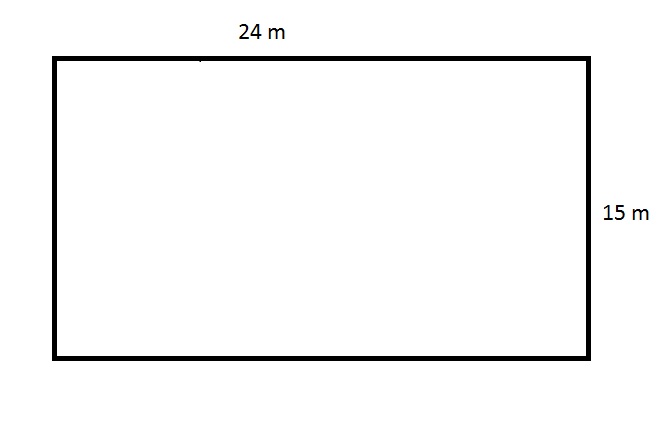All SSAT Middle Level Math Resources
Example Questions
Example Question #1 : How To Find The Area Of A Rectangle
Steve's bedroom measures 20' by 18' by 8' high. He wants to paint the ceiling and all four walls using a paint that gets 360 square feet of coverage per gallon. A one-gallon can of the paint Steve wants costs $36.00; a one-quart can costs $13.00. What is the least amount of money that Steve can expect to spend on paint in order to paint his room?
Two of the walls have area ; two have area ; the ceiling has area .
Therefore, the total area Steve wants to cover is
Divide 968 by 360 to get the number of gallons Steve needs to paint his bedroom:
Since , Steve needs to purchase either two gallon cans and three quart cans, or three gallon cans.
The first option will cost him ; the second option will cost him . The latter is the more economical option.
Example Question #1 : How To Find The Area Of A Rectangle

Give the area of the rectangle in the above diagram.
The area of a rectangle is the product of its length and its height:
The rectangle has a perimeter of 80.64 square centimeters.
Example Question #3 : How To Find The Area Of A Rectangle

Give the area of the rectangle in the above diagram.
The area of a rectangle is the product of its length and its width:
The area of the rectangle is 42 square inches.
Example Question #601 : Problem Solving

Give the surface area of the above box in square centimeters.
100 centimeters make one meter, so convert each of the dimensions of the box by multiplying by 100.
centimeters
centimeters
Use the surface area formula, substituting :
square centimeters
Example Question #203 : Problem Solving

Above is a figure that comprises a red square and a white rectangle. The ratio of the length of the white rectangle to the sidelength of the square is . What percent of the entire figure is red?
To make this easier, we will assume that the rectangle has length 5 and the square has sidelength 3. Then the area of the entire figure is
,
and the area of the square is
The square, therefore, takes up
of the entire figure.
Example Question #4 : How To Find The Area Of A Rectangle

The rectangle above is inches long and inches wide. What is the area of the rectangle?
Note: Figure not drawn to scale.
The area of the rectangle is . In order to find the area of a rectangle, multiply the length (5 inches) by the width (10 inches). The answer is in units2 because the area, by definition, is the number of square units that cover the inside of a figure.
Example Question #2 : How To Find The Volume Of A Figure

The above depicts a rectangular swimming pool for an apartment. The pool is two meters deep everywhere. What is the volume of the pool in cubic meters?
The correct answer is not among the other choices.
The pool can be seen as a rectangular prism with dimensions 24 meters by 15 meters by 2 meters; its volume is the product of these dimensions, or
cubic meters.
Example Question #211 : Problem Solving

Note: Figure NOT drawn to scale.
What percent of the above figure is white?
The large rectangle has length 80 and width 40, and, consequently, area
.
The white region is a rectangle with length 30 and width 20, and, consequently, area
.
The white region is
of the large rectangle.
Example Question #51 : Quadrilaterals
What is the area of a rectangle with length and width ?
The formula for the area, , of a rectangle when we are given its length, , and width, , is .
To calculate this area, just multiply the two terms.
Example Question #161 : Geometry
Order the following from least area to greatest area:
Figure A: A rectangle with length 10 inches and width 14 inches.
Figure B: A square with side length 1 foot.
Figure C: A triangle with base 16 inches and height 20 inches.
Figure A has area square inches.
Figure B has area square inches, 1 foot being equal to 12 inches.
Figure C has area square inches.
The figures, arranged from least area to greatest, are A, B, C.
Certified Tutor
All SSAT Middle Level Math Resources




























































































